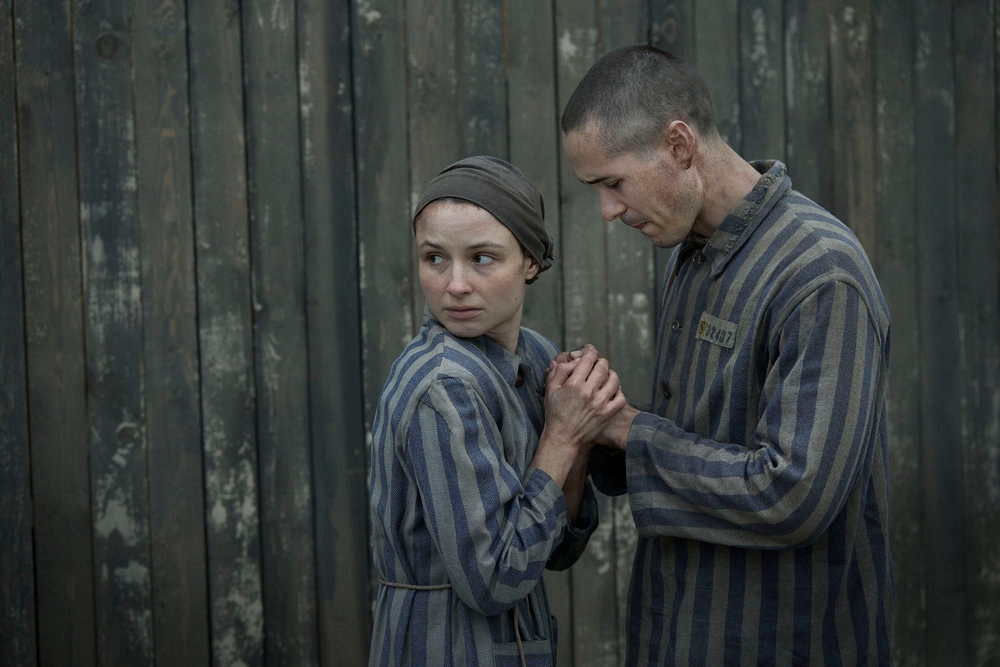A New Beginning for an Old Master
The Autobiography of God
By Julius Lester
St. Martin’s Press, 256 pages, $23.95.
———
Julius Lester is the author of more than 30 books, a diverse collection of novels, essays and children’s fables published over a period of 30 years. Now 65 years old and recently retired from the University of Massachusetts Amherst, Lester’s latest offering might have been a summation of a long and uncommonly varied literary life. Instead, it reads like a new beginning: genre defying, challenging — even scandalous — and alert.
“The Autobiography of God” is a coming-of-age story wrapped in a murder mystery that’s been swallowed by a farce, and shrouded by the cloud of a Holocaust contemplation. Oh, and it’s an American pastoral passing for magic realism in which our protagonist and hero, the irresistible Rabbi Rebecca Nachman, who has deviated in significant ways from the standard rabbinic path, finds herself now employed as a counselor at a bucolic and idealistic New England college.
Few know about deviations and academic careers like Julius Lester does. His official UMASS biography—“came to the University in 1971 as a professor of Afro-American Studies. Since 1988 he has been a Professor of Judaic Studies with adjunct appointments in the English and history departments” — genteelly transmits a dramatic moment in his life, more lyrically recounted in his 1988 book, “Lovesong: Becoming a Jew.” In this work, Lester, a graduate of Fisk University and a veteran of the civil rights movement, was expelled from the Afro-American department when his conversion to Judaism became public.
Like her more famous namesake, Rabbi Nachman of Braslav, Rebecca has a message to transmit but has not quite yet discovered what it is. When we meet her, she is 38 years old and newly divorced from a well-meaning man with whom she was poorly matched, the blue-eyed and blond Dennis. She is not sure that her life counts as “a life — not if having a life meant feeling creatively involved in and connected to those with whom she lived.” Rebecca resides alone, and it seems entirely possible that the 19-year-olds she counsels are no more lost than she is.
But college students turn out to be the least of Rebecca’s worries. Having decided to forgo extra-marital relations with any man, she finds herself pursued by two undesirable colleagues. But even this vexation reveals itself to be insignificant when compared with the unexpected but insistent attention demanded by a group of Jews murdered in the Holocaust. (Part of a heritage-saving scheme, a Torah from the decimated Polish Jewish village of Czechowa is delivered to Rebecca’s home. Inevitably, the unquiet spirits of its former owners soon make their appearance and make their demands known.)
Yet this, too, is quickly revealed to be a relatively minor challenge: In a twist that would be entirely at home in the early, mystical stories of S.Y. Agnon, it soon emerges that God Himself, incarnate, wants a few words with our beleaguered rabbi. Rebecca, lost and honest as she is, has been chosen. Thankfully her sense of humor remains intact. “Rebecca spent the afternoon trying on every dress, skirt, blouse and pair of slacks she owned. She felt like she was getting ready for a date. A date! Had God ever been on a date?”
An excellent question. Whatever the response, Rebecca adopts the original Rabbi Nachman’s dictum not to fear, and crosses even this bridge with dignity. This novel’s surprise ending will shock more than a few readers, but it is all part and parcel of an extended modern world reconsideration of the age-old Jewish grappling with faith and belonging. If the Sabbath is a bride, after all, why not prepare for an encounter with a very human God as you would for a date?
This book is not, of course, the autobiography of God, unless we accept Lester’s premise that the God of our era resides in details, perhaps even in the details of one young woman’s life. The book’s thoroughly contemporary setting is somewhat illusory in that it conceals (just barely) an ancient conundrum: For Lester, as for Nachman of Braslav, the greatest philosophical and religious challenge is not theologically abstract; the test is in how to imbue day-to-day life with the Holy Spirit.
In this, the smart and vivacious Rebecca excels: She is a solitary woman whose newly purchased home has become, in her eyes, a sacred space — so untouchable, in fact, that she cannot imagine any man changing its exquisite balance. Where would she put him? The feng shui would be spoiled. She has almost no furniture, lest anyone be tempted to stay. Even her limp, the result of a childhood accident, becomes, in her divine but defensive construction, the talisman of her essential self.
Lester’s irreverent and occasionally hilarious text — at one point we encounter an emissary of the Lord who is a “colored Jew” called, what else, Hymie (Jesse Jackson, watch out!) — is fundamentally a tender and old-fashioned thing, a paean to the love of God. In an attempt to trump the pity she sees when strangers take in her lame leg, Rebecca has taken to deploying high fashion. “When I limp by in a Ralph Lauren skirt,” Rebecca mentions to the Holy One, “people can’t give me the pity they would like to.”
“You never limped,” He replies. “Just your body.”
The message is all too clear: Only godliness can save us from ourselves, and only if we allow it an abode within. Seen from this simple and sagely perspective, what Lester has produced is an autobiography of god, lower case and on a distinctly a human scale.
As a result, it is difficult to know if his occasionally mischievous message is fundamentally secular, devout or somewhere in the spiritual bog between the two extremes.
But in this aspect, too, Lester seems to be aiming for an utterly Jewish ambiguity, and for a new Jewish text unencumbered by the funny-slash-mortifying acrobatics of much Jewish American male literary identity. The question is one of faith, even if God, as Lester accuses, is a crumpled and classless schlub who was our enemy at Auschwitz. Yes, even at Auschwitz. Lester, who has Jewish forbears, has dedicated this book to his relatives murdered in the Holocaust — and even in the face of an outrageous, disappointing God, he says, it is the duty and the holy burden of the Jews to sustain their faith.
Faith in the sanctity of the word, if nothing else. Describing the catastrophic downfall of a man who commits murder, Rabbi Nachman of New England says he “was able to articulate a vision of what it means to be human but he was unable to live it. He was not as good as his word.”
The Borgesian imperative, in this case, is surprisingly affecting and reads as a present-day hymn to the promise of human creation and rebirth.
Noga Tarnopolsky is a frequent contributor to the Forward.

I hope you appreciated this article. Before you go, I’d like to ask you to please support the Forward’s award-winning journalism this Passover.
In this age of misinformation, our work is needed like never before. We report on the news that matters most to American Jews, driven by truth, not ideology.
At a time when newsrooms are closing or cutting back, the Forward has removed its paywall. That means for the first time in our 126-year history, Forward journalism is free to everyone, everywhere. With an ongoing war, rising antisemitism, and a flood of disinformation that may affect the upcoming election, we believe that free and open access to Jewish journalism is imperative.
Readers like you make it all possible. Right now, we’re in the middle of our Passover Pledge Drive and we still need 300 people to step up and make a gift to sustain our trustworthy, independent journalism.
Make a gift of any size and become a Forward member today. You’ll support our mission to tell the American Jewish story fully and fairly.
— Rachel Fishman Feddersen, Publisher and CEO
Join our mission to tell the Jewish story fully and fairly.
Only 300 more gifts needed by April 30
























